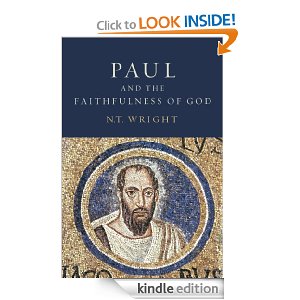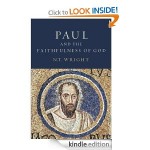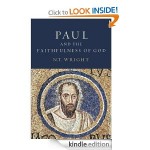“Paul and the Faithfulness of God”: 2nd Posting
by larryhurtado
Yesterday, I posted on Tom Wright’s 2-vol opus on Paul, and in this and a couple of subsequent postings I’ll offer further comments about some features of this work. My first observation in yesterday’s posting was that it’s massive, 2 volumes, over 1600 pages. Wright seems to have taken this opportunity to lay out extensively his views, not only on Paul, but on a wide panoply of other/related matters as well. For those who haven’t seen the work yet, I’ll sketch its contents.
In Volume 1, Part 1 (chapters 1-5), “Paul and His World,” in a leisurely fashion Wright discusses Paul’s Jewish context, the Greek cultural/philosophical setting, the wider religious environment, and the Roman political context. In Part 2 (chapters 6-8), “The Mindset of the Apostle,” Wright sets forth his approach, which involves his emphasis on the “storied worldview” that he sees as framing all that Paul did and thought. Parts 1 & 2 comprise some 600 pages. Granted, Wright’s emphasis that we should take a historical approach, respecting Paul’s historical context, is commendable. But I wonder if it really required this much preparatory discussion before we get down to the exposition of Paul’s theology. (One acquaintance, somewhat impatient with how much space is given to these matters, grumpily complained about the several hundred pages of “throat-clearing”.)
Volume 2 comprises Part 3 (chapters 9-11, “Paul’s Theology”) and Part 4 (chapters 12-16, “Paul in History”). In Part 4, Wright returns to the Jewish, Greek and Roman contexts proposing how Paul’s thought and work relate to them. But it’s obviously “Part 3” (chapters 9-11) that form (in Wright’s own words) the “fulcrum” and crucial core of the work. And so it’s to these chapters that I’ll direct my own observations and engagement in this and subsequent postings.
In Chapters 9-11, Wright organizes Paul’s theology under three main topics: “The One God of Israel,” “The People of God,” and “God’s Future for the World.” Wright contends that in each of these three topics, Paul presents a “freshly reworked” and “freshly imagined” treatment. So, to start with the first topic, Wright proposes that Paul both affirmed “classic Jewish monotheism of his day” and also redrew it “around Jesus.” To quote Wright: “That robust monotheism has been, for Paul, fully rethought around Jesus the Messiah,” producing a “Messiah-shaped monotheism” (687). Indeed, Wright urges, “for Paul, Jesus is seen as the second self (so to speak) of Israel’s God” (696).
Wright engages at various points the work of other scholars who have explored what seems to have been a veritable explosion of christological affirmations in the young Jesus-movement in the earliest observable period after Jesus execution. These others include in particular Richard Bauckham, Carey Newman, and myself. Though appreciative of this work, Wright bids to surpass it in offering what he sees as a more adequate account of things.
So, e.g., citing Bauckham’s proposal that in earliest christological claims Jesus was included within “the divine identity,” Wright bids to subsume this idea within his own proposal that “the early Christians believed that Israel’s one God had returned in person. In the person of Jesus” (654). Indeed, Wright contends that in Jewish tradition of the time, this idea of a personal return of YHWH was well-known, and so became the crucial category by which Jesus’ divine status was understood and articulated in earliest Christianity.
By contrast, Wright doesn’t seem to like quite so much my proposal (originally in my 1988 book, One God, One Lord: Early Christian Devotion and Ancient Jewish Monotheism) that earliest (Jewish) believers drew upon (and radically adapted) what I called “chief agent” traditions (in which God is pictured as having this or that figure who serves as God’s vizier) in accommodating the exalted Jesus while also maintaining the uniqueness of the one God. But it seems to me that Wright hasn’t really engaged my argument, for his references to it appear to me more a caricature than a fair description.
To be sure, as others have noted earlier (including David Capes on Paul’s christological use of YHWH texts; Larry Kreitzer’s Jesus and God in Paul’s Eschatology; Carl Davis, The Name and Way of the Lord; Carey Newman, Paul’s Glory Christology; et alia) there is a remarkably close linkage of Jesus and God in Paul’s letters. But, at the same time, there is an almost equally emphatic affirmation that there are two– God and Jesus– and Jesus is consistently described with reference to God, not replacing God but serving as the one sent forth by God and acting as God’s unique agent of redemption. That is, we have what I call a “dyadic” emphasis, two figures posited and a clear relationship between them.
Indeed, as I have observed in my book, God in New Testament Theology (Abingdon Press, 2010), in NT writings throughout we have a “triadic” shape to the “God-discourse” involving references to “God”, Jesus, and the Spirit. So, I agree with Wright’s discussion in Chapter 9 about how in Paul we see both a “christological” and a “pneumatological” emphasis in the view of God.
But, to engage critically some specifics, I really don’t see evidence in Paul’s letters of an explicit emphasis that Jesus is the “return of YHWH” embodied and in person. To be sure, there are statements in some OT passages and subsequently in other Jewish texts that YHWH promised to renew Israel and come to Israel in eschatological redemption. But my question is what evidence there is in Paul’s letters that this specific idea and these specific texts were particularly cited and central. Granted, Paul cites Psalm 24:1 in 1 Cor 10:26 (to make a point about freedom to eat meat sold in the marketplace). And, granted, later in Psalm 24, there is the reference to “the LORD, strong and mighty” who will come in through the “ancient doors”. It may well be that Paul would have read the latter verses as referring to Jesus (as Wright proposes, 670), but such possibilities are one thing, and explicit evidence that for Paul the idea of Jesus as the embodied, personal return of YHWH to Israel is another.
Granted, in Colossian 1:15-20 we have the statement that in Jesus “all the fullness of God was pleased to dwell” (v. 19). If, as Wright presumes (and as I’m ready to accept as well for the purposes of argument) Colossians is taken as composed by Paul, this is surely an important text. But isn’t it also the case that the passage defines Jesus’s significance with reference to God, linking God and Jesus but, at the same time, distinguishing them? Jesus is pictured here as the unique vehicle (so to speak) or agent of God’s purposes and redemptive actions (esp. v. 20). Is that, however, the same thing as Wright’s claim that for Paul Jesus was the “personal return of YHWH” to Israel?
There are other points that one might engage as well, but one further matter will suffice for this posting. I agree that in Paul’s letters we see what I have termed (from as far back as my 1988 book mentioned above) a significant, apparently novel “mutation” in Jewish “monotheism” and in the typical devotional pattern/practice of Jewish tradition of his time. As I have proposed (and as Wright, too, urges), in its earliest expressions, this “mutation” appears to be a novel development within Roman-era Jewish tradition (e.g., How on Earth did Jesus Become a God?, pp. 31-55), and Paul certainly reflects this remarkable development. Wright’s treatment seems to me, however, to credit Paul with a lot in the formulation of this “mutation”. But I wonder if this is misjudged.
To be sure, Paul appears to have been a pretty intelligent and articulate fellow, and was perhaps particularly skilled in scriptural study and interpretation (from his Pharisee background). But, so far as I can see, the only claims that Paul makes about any distinctiveness or originality concern (1) his conviction that he was specially called by God to conduct a mission to gentiles, and (2) his view of the terms on which gentiles were to be received as full co-religionists with Jewish believers (baptism/faith in Jesus without taking on Jewish observance of Torah). So, was Paul really the creative figure that Wright seems to posit in developing the “high christology” that we see reflected (really presumed) in Paul’s letters? Or, instead, do we have in his letters essentially the sort of claims about Jesus and the sort of devotion to him that Paul acceded to subsequent to the “revelation of his [God’s] Son” (Gal. 1:15) that changed him from persecutor to proponent of Jesus? Indeed, as I’ve proposed, was it these claims and devotional actions that (at least in part) provoked the zealous Pharisee, Saul, to feel obliged to “destroy” (his term) the young Jesus movement? (Something certainly got up his nose!)
Wright’s discussion can be seen as a classic “great man” treatment of a historical figure. Now Paul can be thought of as a “great man” I guess. But Paul himself seems to have been quite ready to acknowledge that he had predecessors in his faith, and that he shared basic faith with them and others.














